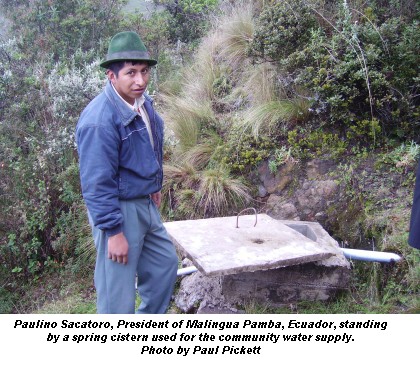Our Water, Our World: Water is All About Peopleby Paul Pickett There's a saying I read somewhere: "water invented people so it could go uphill." And indeed that's been a common experience for me with water supplies for communities: going uphill to see a spring or a tank. Usually the resident leads me up a trail through the brush, and when we arrive, waves his hand to show here it is! When I worked for Indian Health Service in California, a Tribal member led us up through a golden meadow in Mendocino County, through some Manzanita and Bay Laurels and there on the hill side was a piece of plywood on the ground. Here it is! Under the plywood was a spring, a hole dug in the ground, full of water with a few leaves and bugs floating about. A pipe buried in the hillside poked out into the water to carry it to a home below. It needed work, starting with a more sanitary spring box, but there it was: water from the earth, serving a family. In Ecuador, Paulino led us through the drizzle up a verdant green hillside from his village of Malingua Pamba, past pastures of llamas and through thickets of brush. I had to stop frequently, panting and aching, to recover from hiking in the thin air of the high Andes. He led me to a concrete spring box where water gushed from the hillside and into pipes that lead to his village. He waved his arm. ¡Aqui está! My son Meridan helped with translation while Paulino explained how, in order to protect the springs, the village was buying up the watershed, requiring fencing of animals, and limiting burning and grazing in the high alpine páramo grasslands. Of course the hikes were not always up, sometimes they were down. In Santo Tomás Nicaragua, Joel, Emilio, and Henrí led me down a rutted dirt road to a small river, the Rio Quibrada. ¡Aqui está! He waved at the small dam holding back a bit of the river. Wet season rains were beginning to fill the reservoir, but the community was just leaving behind a long dry season. Water was being turned on in town every other day, instead of every other week. The Alcaldía, Office of the Mayor, were showing me their water supply and their plans for raising the reservoir and building new ones so they could provide water through the dry season. I hopped back onto the back of the motorcycle behind Emilio and we drove up the highway. We turned off onto a dirt road and headed toward the town's water treatment plant. As we hiked to the top of the hill and walked around the three concrete storage tanks, we could see Santo Tomás spread out on the plateau below. ¡Aqui está! Different vegetation, tropical not temperate, but people just the same, hoping to get clean water to serve their families. I've had this same experience here in Olympia. An Olympia city staff showed me around McAllister Springs and the huge storage tank on the hill above Lacey. Here it is! Where it all comes from, how we get water for our families. Water is the lifeblood of our planet and the fluid that binds together humanity and all life. Wherever I've gone, wherever you may go, cultures are different, the ecosystems are different, but there it is! Water coming from the earth, filling pipes and tanks, directed to where people can collect it for drinking, cooking, washing, and watering their animals and gardens. That universality of humanity is stunning when highlighted by our common need and use of water. Of the nearly half dozen nations I've visited to date, and the possibly hundreds of people from other nations I've talked with, Americans are by far the most insulated and inward-looking. It seems we want to solve all of the world's problems by ourselves, and we are for the most part remarkably ignorant of people and events outside our borders. Whether it's Middle Eastern war, or immigration policy, or climate change, Americans seem to have a difficult time thinking of these problems as the common problems of humanity. Of course, Dear Reader, I hope this isn't true for you! But it seems especially true with our political leaders and mainstream media. So the lesson I leave is this: when someone says "we need to...", ask yourself "who is that 'we' they are talking about?" And then think of water. Wherever you go, anyone you meet: here it is! ¡Aqui está! This is water, this is humanity, we are all water, we are all in this together. To learn more about Malingua Pamba visit http://www.escuelaminga.org Thurston County supports Santo Tomás through the Thurston-Santo Tomás Sister County Association. Paul Pickett is an environmental engineer, Public Utility District Commissioner, and regular contributor to Green Pages. Learn more about local and global water issues...
|

